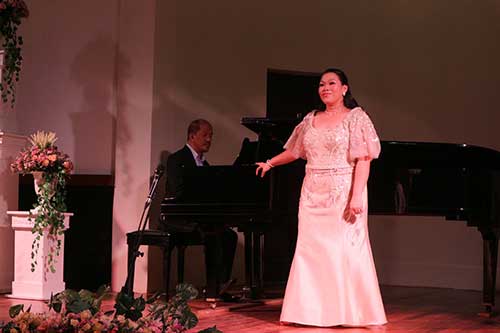
By John Anthony S. Estolloso
THERE IS no dearth of sopranos in the city. But the afternoon and evening of June 20 offered something else.
Soprano Amabelle Pamocol-Castro regaled Ilonggo classical music enthusiasts with her delivery of relatively contemporary and obscure works for the female voice – a rather dulcet introduction for some of the listeners. Departing from the usual repertoire of opera sung in Italian, French, German, or even Russian, the singer offered a selection of songs that would have normally stayed and be appreciated in the confines of a conservatory.
In a manner of saying, the recital was quite a revelation, even in such a familiarly august and reputable venue as the performance hall of UPV’s Museum of Art and Cultural Heritage.
There was no question about Pamocol-Castro’s talent: not that it was the first time we have heard her sing. She has performed superbly time and again in many a concert and recital produced by the University of San Agustin’s Conservatory of Music; most recent and noteworthy perhaps would be her participation as one of the soloists in last year’s grandiose performance of Mozart’s Requiem.
* * * * *
While Robert Browning’s poetry remains a dearly beloved by lovelorn literati, Amy Beach’s arrangements of these poems to music somehow dismantles the maleness of the poetry. Excerpts from these verses are transformed into lyrical masterpieces that exudes Beach’s uncanny understanding of the range and quality of the female voice, and in the process, transcends the tropes associated with a machismo-driven romance.
Paired with this American-British combination of words and music was Fernando Obradors’s arrangement of Spanish folk songs. The final set of his ‘Canciones Clasicas Españolas’ immersed the audience with vibrantly eclectic choices – snippets and snatches of provincial Iberian poetry elevated and set to music, echoing their places of origin: Extremadura, Santander, Murcia, Málaga.
Throughout this unlikely pairing, Pamocol-Castro’s performance was tremulously tender. A tad hesitant at the start perhaps, her delivery gathered momentum and power at each song, and by the time Obradors’s Romance de los pelegrinitos rambled through the pilgrims’ Roman journey, her voice was sweeping the performance hall, with little need of a microphone to amplify it: poet and lyricist Federico García Lorca would have joined the audience’s applause from the grave.
A rather lengthy intermission preluded Leonard Bernstein’s song cycle ‘I Hate Music’. Ironic as it sounds, it was eloquent in its entirety: the witticisms transcending to recitative and the experimentation of musicality glisten of Bernstein in his musical prime. Almost monologic in composition, the cycle passes through five short spiels mirroring a child’s stream of consciousness. In terms of personality, it was no West Side Story in verve and relevance; rather, it was more akin to Candide in its candidness and wit.
Capping the evening were excerpts from Tom Cipullo’s 2007 opera ‘Glory Denied’ and Jonathan Dove’s smaller 2006 opus ‘The Enchanted Pig’. While both are contemporary operas in English, they present a more relatable worldview of classical music coursing through modern life and history. The former poignantly reimagines the life of Col. Jim Thompson, the longest held American prisoner-of-war in the Vietnam conflict; the latter is a retelling of obscure fairy tales, composed perhaps to acquaint younger audiences with the joys of opera.
With these, the dramatic side of Pamocol-Castro was put on the spotlight. The aria ‘My Darling Jim’ was written as a love letter addressed to the prisoner-of-war; though its brevity is well-noted, the tragic gravitas hidden between the lines was not lost to the audience. On the other hand, the more comic side of the singer was necessitated when she delivered Adelaide’s aria from Dove’s opera. Histrionics aside, to sing through one’s irritation and get a standing ovation at the end of it is no easy feat.
Accompanied by Prof. Gerardo Vicente Muyuela on the piano, Amabelle Pamocol-Castro’s recital drove home a crucial point about bel canto singing: it may never seem to catch on with the local mainstream but for all its delicate quirks and idiosyncratic musicality, it transcends the familiar.
[The writer is the subject area coordinator for Social Studies in one of the private schools of the city. The photo is from Marian Sudaria.]




















